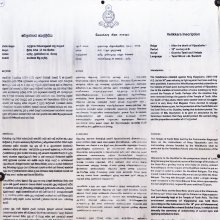Im, Īm: 9 definitions
Introduction:
Im means something in Hinduism, Sanskrit, biology, Tamil. If you want to know the exact meaning, history, etymology or English translation of this term then check out the descriptions on this page. Add your comment or reference to a book if you want to contribute to this summary article.
Images (photo gallery)
In Hinduism
Vyakarana (Sanskrit grammar)
Source: Wikisource: A dictionary of Sanskrit grammarIm (इम्).—Augment इ (i) added to the base तृणह (tṛṇaha), after the last vowel, e. g. तृणोढि (tṛṇoḍhi); cf. तृणह इम् (tṛṇaha im) P.VII.3.92.

Vyakarana (व्याकरण, vyākaraṇa) refers to Sanskrit grammar and represents one of the six additional sciences (vedanga) to be studied along with the Vedas. Vyakarana concerns itself with the rules of Sanskrit grammar and linguistic analysis in order to establish the correct context of words and sentences.
Biology (plants and animals)
Source: Google Books: CRC World Dictionary (Regional names)Im in India is the name of a plant defined with Hopea parviflora in various botanical sources. This page contains potential references in Ayurveda, modern medicine, and other folk traditions or local practices.
Example references for further research on medicinal uses or toxicity (see latin names for full list):
· Plants of the Coast of Coromandel (1811)
If you are looking for specific details regarding Im, for example diet and recipes, health benefits, chemical composition, pregnancy safety, side effects, extract dosage, have a look at these references.

This sections includes definitions from the five kingdoms of living things: Animals, Plants, Fungi, Protists and Monera. It will include both the official binomial nomenclature (scientific names usually in Latin) as well as regional spellings and variants.
Languages of India and abroad
Sanskrit dictionary
Source: DDSA: The practical Sanskrit-English dictionaryĪm (ईम्).—ind. [ī-bā° muc] Ved.
1) A particle of affirmation or restriction; usually after short words at the beginning of a sentence, after यत् (yat), relative pronouns prepositions and particles like उत, अथ (uta, atha) &c.; प्र यदीमुवाचेति (pra yadīmuvāceti) Bṛ. Up.2.5.16.
2) Now.
3) This, here (enam).
Source: Cologne Digital Sanskrit Dictionaries: Benfey Sanskrit-English DictionaryĪm (ईम्).— (an old acc. of ī, f. of i, see idam), a ved. part. which lays a stress upon the preceding word,
Im (इम्).—interj.
--- OR ---
Īm (ईम्).—([enclitic]) used as [accusative] sg. of 1 i, makes a rel. indef.
— ya īm whoever, after other [pronoun] or [conjunctive] emphasizing or only explet.
Source: Cologne Digital Sanskrit Dictionaries: Monier-Williams Sanskrit-English Dictionary1) Im (इम्):—[interjection] [Maitrāyaṇī-saṃhitā]
2) Īm (ईम्):—ind. ([from] pronominal base 3. i), [Vedic or Veda] a particle of affirmation and restriction (generally after short words at the beginning of a period, or after the relative pronouns, the conjunction yad, prepositions and particles such as āt, uta, atha, etc.) īm has also the sense ‘now’ (= idānīm), and is by, [Sāyaṇa] sometimes considered as an [accusative] case for enam, [Ṛg-veda; Vājasaneyi-saṃhitā]
[Sanskrit to German]
Sanskrit, also spelled संस्कृतम् (saṃskṛtam), is an ancient language of India commonly seen as the grandmother of the Indo-European language family (even English!). Closely allied with Prakrit and Pali, Sanskrit is more exhaustive in both grammar and terms and has the most extensive collection of literature in the world, greatly surpassing its sister-languages Greek and Latin.
Kannada-English dictionary
Source: Alar: Kannada-English corpusIṃ (ಇಂ):—
1) [adverb] from this time on; henceforth; hereafter.
2) [adverb] so far; still; till; yet; (in this sense -ಇನ್ನೂ [innu]).
3) [adverb] apart from (this, these etc.).
Kannada is a Dravidian language (as opposed to the Indo-European language family) mainly spoken in the southwestern region of India.
See also (Relevant definitions)
Starts with (+686): Im-khim-lam, Im-pondondlovu, Ima, Ima de, Imabeleyongosi, Imacalam, Imachi, Imadad, Imadada, Image, Image consecration, Image worship, Imagining, Imai, Imaikkuru, Imaikottu, Imaiporuntu, Imaippalavu, Imaippolutu, Imaippu.
Ends with (+873): A-aphaim, Abharavashim, Abhavim, Acacu-mirim, Acai mirim, Acalztatsim, Acim, Adakushim, Adamoharim, Adantrim, Adarim, Adasangadim, Adavinim, Addarim, Adhaim, Adhastalim, Adhastapim, Adhibidim, Adhim, Adhimbidhim.
Full-text (+17561): Imkara, Imkrita, Praticineda, Guhahita, Bhutapurnima, Jalakeli, Mahakarttiki, Nistani, Utpitsu, Ambuga, Krishtaradhi, Muraganda, Girivasin, Aranyabhava, Grihevasin, Kritsnayata, Aranyenuvakya, Dharmadana, Grishmavana, Grasashalya.
Relevant text
One of your search terms exceeds the minimun character amount per search term. This amount currently equals 2.
No search results for Im, Īm, Iṃ in any book or story.

